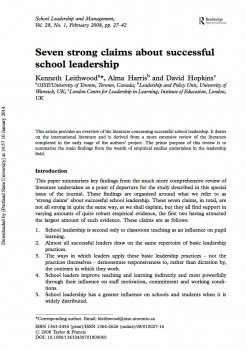The authors provide an overview of literature concerning school leadership and make seven claims about successful school leadership:
- School leadership is second only to classroom teaching as an influence on pupil learning.
- Almost all successful leaders draw on the same repertoire of basic leadership practices.
- The ways in which leaders apply these basic leadership practices–not the practices themselves–demonstrate responsiveness to, rather than dictation by, the contexts in which they work.
- School leaders improve teaching and learning indirectly and most powerfully through their influence on staff motivation, commitment and working conditions.
- School leadership has a greater influence on schools and students when it is widely distributed.
- Some patterns of distribution are more effective than others.
- A small handful of personal traits explains a high proportion of the variation in leadership effectiveness.
Authors: Kenneth Leithwood, Alma Harris, and David Hopkins




